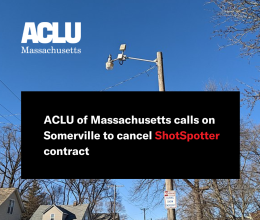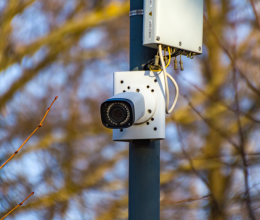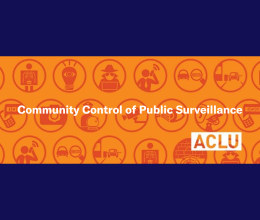
Today, Sen. Karen Spilka and Rep. Sarah Peake join the ACLU of Massachusetts in urging the state legislature to focus on the issue of personal data privacy and to pass the Electronic Privacy Act (S.903/H.1531), which would make important advancements in protecting the privacy of all citizens in the Commonwealth.
The call to action in Massachusetts is one of 17 taking place simultaneously throughout of the country—from Hawaii to North Carolina, from Alaska to Alabama, and from New Hampshire to New York to New Mexico—with a diverse, bipartisan coalition of elected officials and citizens coming together to tell the nation they care about their digital privacy and are willing to join together to fight for it. The message from these collective actions by the states is clear: where Congress is unwilling or unable to act to protect Americans' privacy, or takes actions that are insufficient, the states are more than willing to step up and fill the void. Together, these states have introduced a range of new legislation that includes protections for student privacy, location tracking and personal data.
The multi-state effort is using the Twitter hashtag #TakeCTRL.
The Electronic Privacy Act, pending in the Massachusetts state legislature's Joint Committee on the Judiciary, would guarantee in statute that law enforcement must get a warrant before asking phone and internet companies to turn over users' personal electronic records, including the content of electronic communications, personal information stored in the cloud, and location information transmitted by phones and other devices.
"The fundamental right to be free from unreasonable search and seizure is firmly entrenched in our state's history," said Senator Spilka. "Our electronic devices store some of our most private thoughts and details of our daily activities, and this personal information should not be open to government inspection without a warrant. The Electronic Privacy Act protects the privacy of Massachusetts residents, updating our search warrant laws to fit the realities of the digital age."
"The warrant standard is more than 200 years old," said Representative Peake. "It has long protected our physical property, and it is time to update the law to make sure it fully protects the personal data we entrust to phone and internet companies, too."
"Every person should have the power to decide who they want to share personal, private information with. Privacy is not about keeping secrets, it is about exercising control over our own lives," said Carol Rose, Executive Director, ACLU of Massachusetts. "We're grateful to Senator Spilka and Representative Peake for their leadership, which affirms that privacy remains a core value in our state and throughout the United States of America."
"The guiding principle for protecting Americans' privacy in 2016 is the same as it was in 1776: Get a warrant, get permission, or get out," said Kade Crockford, Technology for Liberty Director, ACLU of Massachusetts. "More and more we're seeing gross overreach into our personal information. Massachusetts residents need these protections now more than ever—and this is a fight I am proud to say that Democrats and Republicans, progressives and conservatives are undertaking together. On the issue of privacy, Americans from all over the political spectrum are truly united."
The bipartisan actions by the states, which are intended to highlight the strong and diverse nationwide support for legislation that empowers people to take control of their privacy, are mirrored by the results of a recent poll conducted by Anzalone Liszt Grove Research, which found that 90% of Americans believed (73% of them "strongly") that the next president should make "protecting privacy so we have more control over our personal information" a policy priority.
The 16 diverse states joining in today's announcements represent 30% of the nation's population; their bills have the ability to impact nearly 100 million people; and they collectively account for 169 electoral votes.
Additional Background:
- The Electronic Privacy Act would clarify under Massachusetts law that a warrant is required before law enforcement obtains, at a minimum: the content of electronic communication such as emails or chats; information stored online in "the cloud," such as photos, documents, digital address books and calendars, or internet search terms; and real-time and historical location information. It would provide clear rules, standards, and procedures to law enforcement, give guidance to companies that hold personal electronic records, and guarantee protections for the public. Courts at every level are faced with constitutional challenges to warrantless surveillance, and they have largely supported robust Fourth Amendment protections in the digital age. However, such cases can take decades to develop and be decided by the highest courts, while inadequate laws on the books lead to confusion and ongoing privacy violations in the interim.
- ACLU of Massachusetts testimony about the Electronic Privacy Act can be found here.





